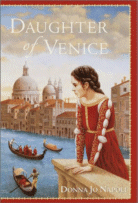Daughter of Venice
Wendy Lamb Books, March, 2002.
Hardcover, 228 pages.
ISBN: 0385327803
Ages 12 and up
 Daughter of Venice immediately plunges the reader into
the fascinating and totally alien world of late sixteenth century
Venice. This is such a forgotten world that a modern reader
will be shocked at the system of family and custom that conspired
to imprison a young woman. Donata, the daughter of a powerful
and wealthy family of the city state of Venice, will most likely
not be able to marry. In order to preserve the family's fortune,
only one son and one daughter would be permitted to marry.
The others will stay at home or take up careers in business or
politics. Daughters had a choice of being maiden aunts and
therefore nannies to the nieces and nephews that would be
born to the siblings permitted to marry, or a life in a convent
where they could teach and otherwise care for the children of
the poor. Education would not be wasted on daughters, because
they would have little cause to use it. They would be expected
to do fine needlework, play a musical instrument or
raise children. Unfortunately,
Donata, the more aggressive of the second born twin girls is
bedeviled by an inquiring mind and an adventurous spirit. She
longs to be free to roam the streets of Venice and learn things
for herself. Donata forms a plan to pursue her dream and she
enlists her siblings in the conspiracy.
Daughter of Venice immediately plunges the reader into
the fascinating and totally alien world of late sixteenth century
Venice. This is such a forgotten world that a modern reader
will be shocked at the system of family and custom that conspired
to imprison a young woman. Donata, the daughter of a powerful
and wealthy family of the city state of Venice, will most likely
not be able to marry. In order to preserve the family's fortune,
only one son and one daughter would be permitted to marry.
The others will stay at home or take up careers in business or
politics. Daughters had a choice of being maiden aunts and
therefore nannies to the nieces and nephews that would be
born to the siblings permitted to marry, or a life in a convent
where they could teach and otherwise care for the children of
the poor. Education would not be wasted on daughters, because
they would have little cause to use it. They would be expected
to do fine needlework, play a musical instrument or
raise children. Unfortunately,
Donata, the more aggressive of the second born twin girls is
bedeviled by an inquiring mind and an adventurous spirit. She
longs to be free to roam the streets of Venice and learn things
for herself. Donata forms a plan to pursue her dream and she
enlists her siblings in the conspiracy.
Donna Jo Napoli weaves the special world of sixteenth century Venice so deftly into this story of teenage rebellion that the reader actually begins to worry about the fate of this headstrong young woman who is so driven by her great intelligence. The reader quickly begins to understand how the people of Venice solve their problems by being practical in all things. Jews and Lutherans are tolerated because they bring wealth to the city, and the Vatican is constantly out maneuvered on matters of faith versus matters of business. A painting of the Last Supper of Christ by Veronese which was deemed too wild by the Inquisition was simply renamed by the Committee on Heresy. The painting became the Banquet at Levi's House and Venice did not have to lose a great work of art or a talented artist. One feels great fear for a young illiterate woman disguised as a fisher boy who is trying to find her way among the maze of winding streets and canals of Venice.
Daughter of Venice is the kind of book that a young person will really enjoy because it treats life's problems in an honest way, but does not pontificate about what one ought to do. The reader simply sees Donata work out her problems of not wanting to marry the young man picked for her, of her first crush on an older man, and of trust and honesty within a family. The family values of this exciting story work themselves out because the family has built itself on love and honesty. Donata's fate evolves into a very satisfying conclusion, and the reader has become very well acquainted with a world that has largely been forgotten. History in the hands of Ms. Napoli becomes fascinating and exciting.
-- Sarah Reaves White
Daughter of Venice is available for purchase on Amazon.com
Note: We may receive a commission from sales made through product links in this article.
This review was published in the June, 2002 of The Internet Writing Journal.
Copyright © Writers Write, Inc. All Rights Reserved.
